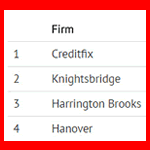This is a guest post by Peter Sargent, an Insolvency Practitioner and Consultant at BHP Clough Corporate Solutions. He is a member of the IPA’s Membership & Authorisation Committee and former president of R3.
The failure of Varden Nuttall (and its holding company), a middle ground IVA bulk provider has brought into sharp relief the current system of Insolvency Practitioner (IP) regulation. That and the failure of a number of debt management providers is surely setting off alarm bells within the Insolvency Service and the Financial Conduct Authority.
Traditio nally IPs owned or had a stake in the firm they worked for, and as a result traditional IP regulation always looked at the IP, not the firm, and concentrated on case and not firm management.
nally IPs owned or had a stake in the firm they worked for, and as a result traditional IP regulation always looked at the IP, not the firm, and concentrated on case and not firm management.
Now many appointment taking IPs work for IVA bulk providers and firms which provide insolvency services. They do not have a financial stake nor any role in the management of the business.
As an outsider looking in (I have never worked for an IVA bulk provider), it seems to me the best of these firms have invested heavily in both systems and staff training. They keep them under review and updated constantly and are very good at what they do. Size appears to be of no consequence, and whilst the biggest may not always be the best, good systems allow many more cases to be handled by fewer well trained people.
IVA bulk providers seem to attract referrals in many ways, but the one which concerns me the most is the referrals from work finders, sometimes called lead generators. Are these work finders regulated in any way? Even if they are, are the work finders giving best advice, or are they simply looking for a referral or fact finding fee from the IVA work provider? What happens to people who are not suitable for an IVA and who are not being put forward by the work finder?
The failure of Varden Nuttall and other debt management providers must bring into focus the need to review how IPs and the wider profession are regulated.
This topic was discussed in the “Reforming our Insolvency Regime” session at Insolvency Live! on 28 July. In my opinion this should include the following areas:
- Even though we still have a multiplicity of regulators (numbers are reducing) it is time for those regulators to develop a common approach to regulation.
- Those regulators should not just examine the IP but look at the firm, and where appropriate work finders.
- The control of case funds should remain solely with the IP appointed; the IP should have a seat on the board so as to have an input into how the firm is managed.
- Financial accounts for IP firms and those firms providing debt advice should be produced to a common standard.
- Finally it is high time serious consideration be given to a single independent regulator to pull all the strands of a diverse profession together.
For another perspective, but sharing some of the same conclusions, read Meg van Rooyen’s article: Why the FCA must regulate insolvency practitioners and lead generators.
UPDATE September 2016: I have published an article Lead generators – the case for regulation that looks at this aspect in more detail.



Steph says
Im really sorry, im not thick but what exactly does this mean in lay mans easy to understand terms? Im with Varden Nuttall and this post doesn’t make anything any clearer. What is a work finder? And I still can’t comprehend how an Insolvency Practitioner can go insolvent!!!
Sara (Debt Camel) says
Hi Steph, this article is looking at how IP regulation might change in the future, it’s mainly aimed at debt advisers and regulators.
As you point out, the question of how an IVA firm goes insolvent is interesting! It shouldn’t happen, which suggests that perhaps regulation needs to change to make sure it doesn’t happen again.
A “work finder” is a firm who sells someone’s name to an IVA firm – often these are unregulated firms who cold call people, offering “a little known government solution to wipe out 80% of your debts” or something similarly inaccurate but enticing.
Have you seen the latest up date on the VN article? https://debtcamel.co.uk/varden-nuttall-iva-administration/
Steph says
Thanks Sara, I hadn’t seen that article but makes interesting reading. Im now less hopeful than ever about completion. What a mess!
Nick Pearson says
As I understand it there are relatively few IPs (c2000?) yet some 9 different regulators, some of which only regulate a handful of IPs. It is surely the case that as a first step there should only be 1 regulatory body. The snag is, based on my experience as a Director of a large DM/IVA firm, the existing reg bodies are not equipped to undertake the prolonged deep dive forensic analysis of IVA providers in the way FCA are.
The vast majority of IVAs are carried out by a relatively small number of firms, some of which have used the ‘Insolvency’ exemption to avoid FCA regulation. I have written to both FCA and HMT to outline why this is a mistake and a receipe for consumer detriment – detriment that is already endemic in this sector already.
Lead Gen firms who do not breach the FCA perimeter guidance are only regulated to the extent that FCA auth firms who buy the leads are responsible for carrying out due diligence etc on the firms that supply the leads.
As I have said before, if IVAs were invented today rather than in 1986 I am certain that they would be delivered by the NFP debt advice sector and not by commercial firms. Conversely if DROs had been invented in 86 it would be commercial firms delivering them for a (substantial) fee and not free to client providers as today.
In short, the FCA should regulate IPs and the firms they work for and the Insolvency Service should look at ways NFP debt advisers can deliver IVAs without the need for expensive and time consuming qualifications designed to keep IPs a very highly paid closed shop charging fees that bear no relation to the work carried out in consumer IVAs.
Gareth says
Yes, Nick! Love it!
meg van Rooyen says
hi
very interesting! To add to the general theme, have a look at the Money Advice Trust blog here.
http://www.moneyadvicetrustblog.org/2016/08/02/why-the-fca-must-regulate-insolvency-practitioners-and-lead-generators/
Sara (Debt Camel) says
Very interesting blog, Meg. As not everyone will read the Comments, I’ll add a link in below the main article.
Meg van Rooyen says
Thank you Sara! that would be great.
meg
Lou Yates says
Morning all. I had to pen a response this – my favourite subject after all.
I’m pleased these issues are finally getting some debate. I’ve felt like a lone voice for the last 2 years pleading with the free sector to look underneath the bonnet of their IVA partners and trying to get the insolvency regulators to wake up and smell the coffee. I’ve repeatedly chewed the ears of all the contributors to this post, finishing off with poor Meg yesterday. I don’t think I came up for air and hope she forgives me.
Over the last two years I’ve had at least 3 legal letters from Insolvency firms unhappy about my exposing their failings and shortcomings and I’ve had calls and threats to “ruin me” from some too. Folks wiser than I have said why do it? – You don’t gain anything from it; you just make yourself a target. I am somewhat cursed with strong sense of justice and rigid views on right and wrong that I just cannot shake, even if it’s of no benefit to me or not my fight. I’m also keen to preserve IVA as a debt solution. It’s a great debt solution that provides a good balance of debt forgiveness and delivers people into debt free futures when used correctly.
I’m concerned that now things are starting to come to light and the problems with some IVA Providers becomes more apparent, the rest of the industry will make knee jerk reactions. Nick and I mostly agree on this type of thing, but not in this instance. The suggestion that Debt Advisors could/should take over the role of IP in an IVA is just bonkers – I’m wondering if you keep saying it because you know it winds me up Nick :) . It’s not feasible for 101 reasons but mostly because you are looking at the problem with IVA providers as just a front-end advice issue but it’s not.
The client’s journey to the IP, misleading promotions and poor (if any) advice is major worry for me too, but I can forgive all of that to an extent if the debtor gets the best solution and ultimately achieves a debt free outcome. Disappointingly, average failure rates in the sector are hovering around 40%. One of the volume IP’s I work alongside has a failure rate of just 11.9%. That’s a HUGE difference in outcomes. Plus if the average is 40%, there is a firm or firms out there failing more people that they help in droves.
In terms of the lead generator and IP exemption loopholes – I hate this situation with a passion as well. I think there is a relatively quick and simple solution. FCA authorisation of IP’s could only ever extend to the advice area of Insolvency anyway. It wouldn’t make much difference to the management of the cases and outcomes. A simple rule that EVERY client entering into an insolvency solution MUST have received full advice from an FCA authorised firm or organisation would achieve the same result and quicker.
In addition to Peter’s points, I believe the following areas need to be taken into account when assessing the quality and compliance of an IVA provider.
Insolvency Service sanctions – In a recent update, the general public can now access information on Individual Insolvency Practitioners subject to sanctions here https://www.gov.uk/government/collections/current-insolvency-practitioner-sanctions I have concerns about why the Insolvency service is allowing firms with such poor disciplinary records to continue to purchase large books of clients form other IP’s. Let them prove they can do the job properly first!
Creditor Agents– I only recently became aware of how few people knew of the existence of TiX rankings. TiX seem to want keep them close to their chest, but I’m on some Key Performance Indicators like case setup, outcomes, distributions and closures. The top twenty firms (In terms of volumes) are ranked. An overall rating between 1 -20 is awarded. The scorecards are issued to the firms twice yearly in January and August. Each firm receives their own ranking, so we don’t get to see how our competitors are performing. Although the rankings are only made available to the individual IP firm concerned, if you are considering a partnership with a firm you could ask to see them. I wish they could make this data available to debtors too. The other creditor voting agents also provider similar rankings and data.
Nick Pearson says
Hi Lou, We do agree on most things and indeed I agree with almost all of this comment. I promise you my frequently expressed views on opening up IVAs to NFP sector is not just done to wind you up. I’ve done a lot of this type of slow burn guerilla tactics on issues in the past and with some success. Basically the tactic is to keep banging the same drum and the same view consistently to anyone who will listen (or been forced to listen).
It will take some time to get the reform of IVA delivery that’s urgently needed to make it a sustainable, affordable and as well regulated as it should be. At present IVAs are a niche product delivered to a small number of debtors – there should really be many 10’s of thousands more folk benefitting from them as do currently. It’s clear that only root and branch reform will open the IVA up to all those who could benefit from it.
Lou Yates says
We agree on tactics too Nick – repeat the same thing over and over till people give in. It’s working. Im hoping we can come together as a sector to find a real workable solution that celebrates the IPs that do it right, and engender change in the ones that don’t. ??